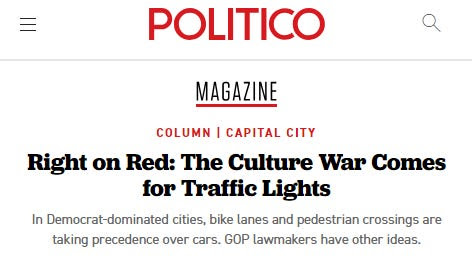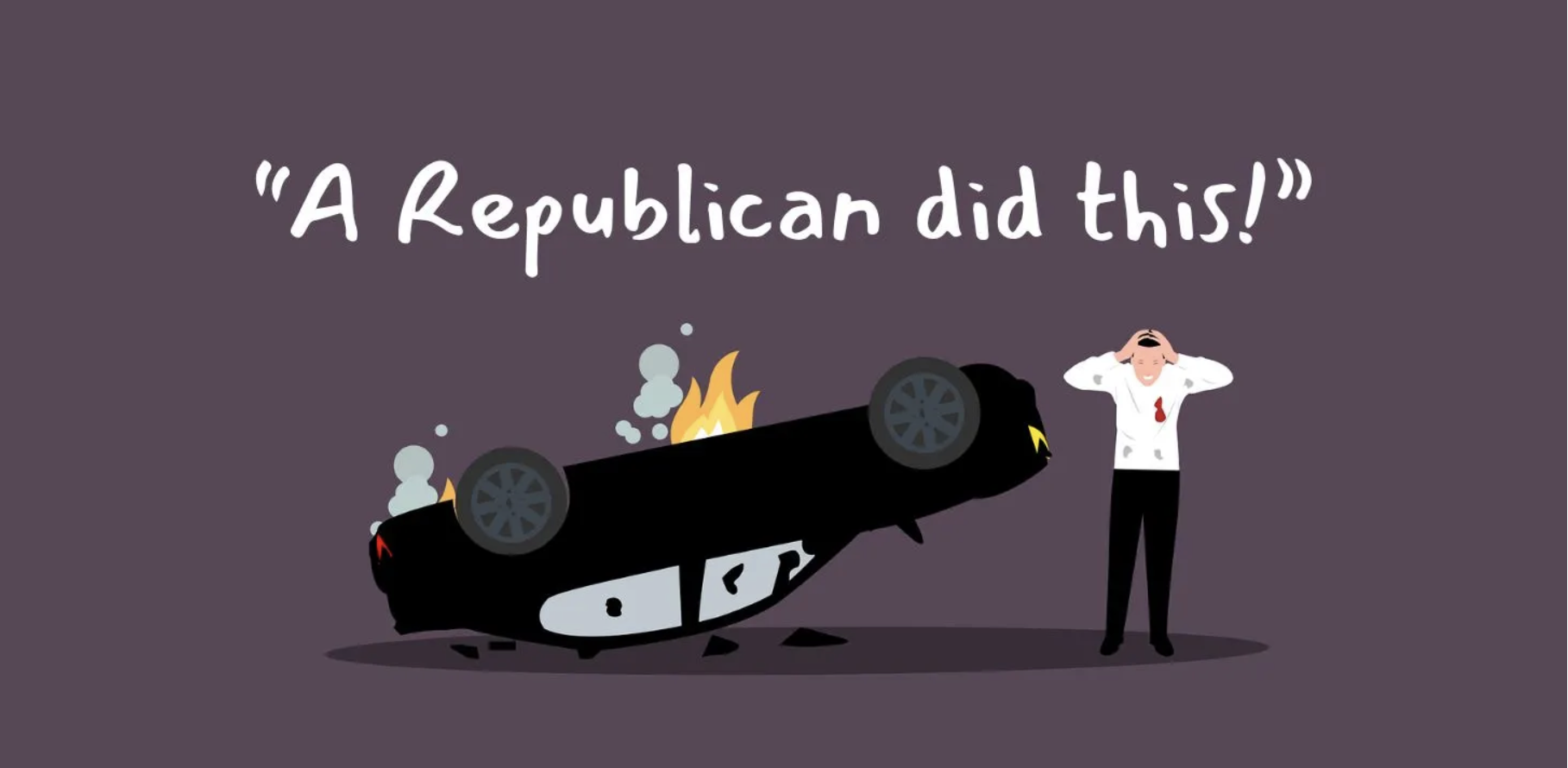Editor’s note: This article originally appeared on Urbanism Speakeasy and is republished with permission.
There’s a large chunk of the country who votes for their political team no matter what. Political strategists know this from decades of anonymous surveys. Of course, you and I only ever meet or interact with independents (wink wink); it’s the rest of the country I’m referring to.
When the vote-my-team person is led to believe the opposing team supports a policy, their instinct is to oppose that policy. Even if the policy bumper sticker slogan sounds good, there must be a catch because opposing teams aren’t supposed to agree on anything.
Recently, I lost a few minutes of time reading a POLITICO story where senior editor Michael Schaffer frames traffic safety as a partisan issue: Team Blue wants to save you, while Team Red is fine with you dead. Look how they chose to file the story:

I’ll never get my reading time back, but maybe writing about it will be useful for you.

The premise of the article is that banning right-turns on red is a safety measure promoted by Democrats and opposed by Republicans. After establishing that he’s on the right side of history, the author has this to say:
One of the [traffic safety] proposals would forbid Washington’s local government from banning right turns at red lights. Another would do away with the automated traffic-enforcement cameras that ticket D.C. drivers for speeding, blowing stop signs and other violations.
The provisions are not just a case of earnest traffic-engineering wonkery sneaking into Congressional oversight. They represent a culture-war cause just as real as D.C.’s needle-exchange efforts or mask mandates, two other targets of current GOP riders. At the core of it is the politically revealing question of cars versus other ways of getting around.
In blue cities across the country, local road policy in the past decade has been tweaked in the name of making things safer and more enticing for non-drivers — often by making things slower and more annoying for motorists.
But pretending traffic safety is a partisan issue, an entire team will oppose it. This kind of clickbait content doesn’t help eliminate life-altering crashes.
If POLITICO’s goal was to call attention to loss of life and limb, their focus would be on the efficacy of banning right-turns on red. Instead, this serves to tell Republicans that “right-on red must be good because the author is smearing us.”
An exception would be to motivate the base. That is, if you’re a Democrat talking only to Democrats, it’s very powerful to get fellow Democrats fired up about an issue by making it partisan. But POLITICO isn’t claiming to be a blue newsletter. If their goal was to investigate roadblocks to Vision Zero, they would’ve approached the article from a completely different point of view. Right-turn on red would’ve been just a foot in the door to talk about the real problems.
Senior editor Michael Schaffer goes on to say:
Never mind that street-level traffic regulations in America tend to be up to the locals — or that the rules in cities, by definition, end at the city limits. This year, local no-turn-on-red efforts in Phoenix and Indianapolis were targeted by GOP legislators in Arizona and Indiana state houses. A federal Congress with no voting member from Washington is going to be even less restrained about it.
This is factual but not truthful. Factual, because there are Republicans who oppose Vision Zero efforts. But not truthful, because there are Democrats who oppose Vision Zero efforts. It’d be like writing an article about two families in California eating organic food instead of processed food, and two families in South Carolina living on a diet high in sugars and chemicals, and drawing the conclusion that Californians are pro-health.
The whole thing is cartoonishly silly for several reasons.
First, anyone who has worked in traffic safety for more than five minutes knows American politicians wage a bipartisan war against safe streets. Vision Zero is blue and red. The status quo is blue and red, too.
Second, of all the important topics related to eliminating life-altering crashes, right turn on red is low on the list. Not because it’s nothing, but because it’s next to nothing compared to super important issues like speed management.
Third, driver behavior is terrible in this country, regardless of how those drivers vote. There are known comprehensive ways to improve traffic safety, regardless of how drivers vote. And yet across the country, politicians will interfere with a safe systems approach.
Fourth, politicians from both teams are standing in the way of proven treatments like automated camera enforcement, roundabouts, bike lanes, curb extensions, road diets, dedicated transit lanes, zoning reform, and parking reform. All of those play a proven role in traffic safety.
Public trust in corporate journalism is at an all-time low, but it doesn’t seem to phase publishers like POLITICO. This article isn’t helping their reputation. There are absolutely times when eliminating right-turn on red is a great safety improvement. But this article doesn’t serve to improve safety; it’s just cranking out clicks.
The post Opinion: How to Make Half the Country Oppose Safe Streets appeared first on Streetsblog California.






